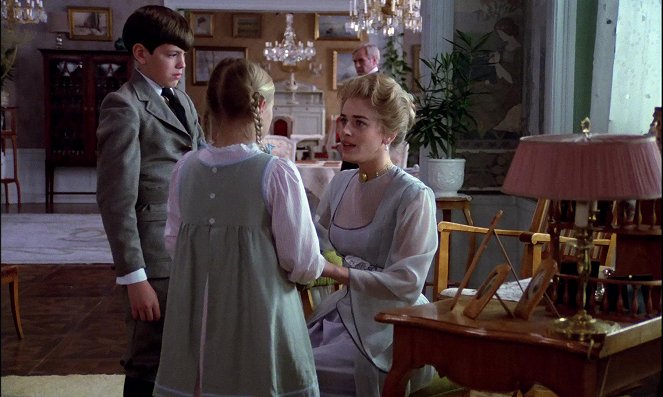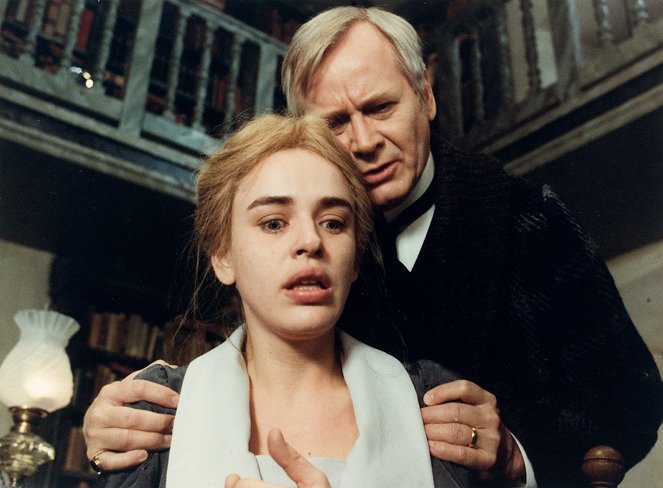Regie:
Ingmar BergmanDrehbuch:
Ingmar BergmanKamera:
Sven NykvistMusik:
Daniel BellBesetzung:
Pernilla Allwin, Bertil Guve, Börje Ahlstedt, Harriet Andersson, Mats Bergman, Gunnar Björnstrand, Allan Edwall, Stina Ekblad, Ewa Fröling (mehr)Inhalte(1)
Fanny und Alexander stammen aus einer alteingesessenen schwedischen Familie, die ein Theater besitzt. Als ihr Vater Oscar stirbt, wendet sich ihre Mutter Emilie dem Bischof Vergérus zu. Sie heiratet ihn sogar und zieht mit den Kindern in dessen Residenz. Dort wird das Leben für die drei zum Martyrium. (TELE 5)
Videos (4)
Kritiken (7)
Vor einiger Zeit kam ich aus Bergmans kleiner Welt heraus, dieser Bühne voller Menschen, die verschiedene Masken trugen... und ich ringe immer noch nach Worten. Fanny und Alexander ist ein brillanter Film. Ich sage das mit aller Gewissheit. Genial, weil er die große Welt widerspiegelt. In diesem kolossalen und mitreißenden Epos über eine schwedische Familie werden tiefgreifende philosophische Fragen aufgeworfen, die bis zum Kern unseres Wesens reichen. Wahrheit und die Lüge. Liebe und Hass. Glaube und Zweifel. Realität und Fantasie. Bergman stellt dem Betrachter keine Fragen. Er lässt sie vor seinen Augen "passieren". Und der Betrachter muss sich fragen. Und der Betrachter muss nach Antworten suchen. Ein Grundsatz des europäischen Kinos: Fragen stellen, nicht ins Leere starren und sich unterhalten lassen. Dieser Film erfordert einen aufmerksamen Zuschauer, der zwischen den Zeilen lesen kann, der nach Dingen sucht, der sich eine Meinung bildet. Wie oft brechen Wort und Bild auseinander und die Figuren erzählen Geschichten. Und du musst sie mit deiner Vorstellungskraft erschaffen, Bergman gibt dir nur den Anstoß und öffnet den Raum für die Vorstellungskraft. Fanny und Alexander ist wirklich das Hauptwerk des Meisters. Es gibt einen überschwänglichen Mystizismus, der explizit und physisch dargestellt wird, eine tiefe Psychologie, die jede Figur zu einem komplexen Universum macht, und einen subtilen Humor (der in seiner Freundlichkeit und Alltäglichkeit an Fellini erinnert). Ich glaube nicht, dass dieser Film idyllisch und hymnisch ist; im Gegenteil, unter all den feierlichen Tönen fließt ein Strom der Tragödie wie ein unterirdischer Fluss entlang. Die Schuld, die uns begleitet und sich zeigt, wenn wir es am wenigsten erwarten. Zeit, die wir nicht anhalten können und die uns an den Klang der Uhr erinnert. Die allgegenwärtigen Narben, die den Tribut für unsere Taten darstellen. Selbst Alexander, der eine aufregende magische Verbindung mit dem wundersamen Ismail eingeht, kann dem Hass, der ihn kennzeichnet, nicht widerstehen... Und doch - Bergman setzt seine ganze Hoffnung auf ein neugeborenes Leben. Und auch in die schöpferische Phantasie, die - ob tragisch oder humorvoll - die Welt verändern kann... Bergmans filmische Welt ist ein Kinderwunderland, in dem die Dinge die Stimmung des Augenblicks ausstrahlen und auf die alltäglichste und doch wundersamste Weise geschehen... und vielleicht ist deshalb ihr Kontrast zur kalten, bösen und rationalisierten Welt der Erwachsenen (verkörpert durch Bischof Edvard Vergerus) so stark und schmerzhaft. Fanny und Alexander ist eine Welt im Film, ein wiederbelebter Ausschnitt einer anderen Realität, in die man sich einfügen kann, aber nicht muss. Für mich ist es eine Welt, in der ich alles finde, was den Film zu einem kraftvollen Medium macht und vor allem - KUNST! Leute, schaut ihn euch an und seht, ob ihr (nach all den kolossalen Großproduktionen) immer noch mehr könnt, als nur einen Film zu sehen!
()
An intimately tuned trip to the Swedish bourgeois society of the early 20th century, where Ingmar Bergman projected his childhood memories mixed with his extraordinary imagination into the film. He filmed it as a mature creator who learned from his mistakes and who cared about the acceptance of his work by the wider public. Some of his previous works brought artistic critics to ecstasy, but for viewers, they were on the verge of bearability. The director abandoned the harshly pessimistic view of the world and, although he does not avoid the topic of death and the loss of a loved one here either, optimism prevails, and the final family celebration ends completely idyllically. The story can be considered a confrontation between the thinking and values of the liberal bourgeois upper middle class and Protestant intolerant bigotry. The clash between the bishop and the little Alexander can be seen as a conflict between modernity and remnants of medieval thinking. Love for the theater (Bergman considered himself much more of a theater director than a filmmaker) is inserted into scenes from the family theater environment, which is directly related to the plot, where the little protagonist's mother works as an actress and his father is a theater director. It is no coincidence that Alexander's father dies on stage... The film is dominated by excellent acting performances - thanks to his position, Bergman was able to work with the best Swedish actors, and he also raised a number of actors himself, who knew well what their boss wanted from them. The film has excellent camera work and carefully chosen costumes and sets. In my opinion, this is Bergman's best film. Overall impression 95%. The best scenes are the ones with Alexander's stay in the house of the Jewish merchant, where the exoticism of the environment merges with the child's imagination and creates a surreal atmosphere.
()
The first hour is full of life, physical pleasures, warm colours, and opulently furnished and spacious rooms, which give the protagonists a lot of freedom. Many characters, many micro-stories, the joy of discovery. After the father’s death comes a severe cooling, rigorous rules, austere interiors with minimal furniture, small closed rooms and more detail shots of faces. The family farce turns into a claustrophobic psychological horror film culminating in an extremely unpleasant scene in which Alexander is punished for letting his imagination run riot and taking the liberty of doing that of which Bergman’s autobiographical last will and testament is a celebration – telling a (fictional) story. There follows a magical scene of rescuing children, who at one moment appear to be in two places at the same time. Our willing to believe fiction (suspension of disbelief) is equally as important as fiction itself, those little worlds into which we can escape. The rules of the hitherto more or less realistic fictional world simply had to be broken in order for the children to escape the bishop and for the story to continue. Either accept it or let it be. Great art is born of great pain and the restriction of choice thus paradoxically stimulates Alexander’s imagination, which is his last refuge and on whose understanding and acceptance the third and most imaginative act of the film is focused. If Bergman truly excelled at anything, it was mise-en-scène direction. Few films prove this as convincingly as Fanny and Alexander, in which he captivatingly summed up the ideas and stylistic processes of his life’s work (even though the protagonists are children, the theme of aging and dying also emerges). The crowning work of a master at the peak of his powers. 90%
()
Watching Fanny and Alexander is not like watching an ordinary movie, it's more like reading a novel. It can be a bit demanding to watch it all at once, but returning to it in the right mood brings a delightful experience. Although Bergman's life confession lacks surprising or dramatic moments (and is therefore difficult to focus on), it is a captivating narrative with amazing performances and beautiful dialogues.
()
In the same way that Oscar Eckdahl believes that his little theatre reflects a piece of the big world outside it, this little movie is a reflection of our big world too. Fanny and Alexander is the last of the Master’s film works (just television projects followed) and seriously he quitted when he was out on top. The three-hour version is a picture that lives a life of its own. The atmosphere sucks you in and gives you the feeling that you have been watching for much longer than the movie’s running time. But it’s a time pleasantly spent, avidly following the (ir)regular lives of the Ekdahl clan through Alexander’s innocent perspective. There is nothing to fault in terms of acting and technical considerations, perhaps just Bergman’s theatrical directing. But who cares when it’s so indescribably effective. Some day I would certainly like to see the five-hour cut, because there are a couple of places where it trails off a bit.
()



Werbung